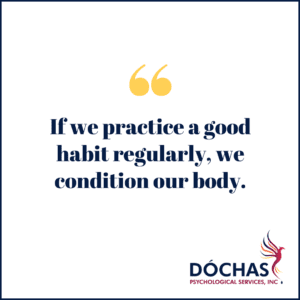Hi, it’s Annika on the Dóchas blog and today, I am writing about how to change a habit.
Changing habits is a challenging venture! Coming up with ideas of habits you want to change might not be too difficult—just think of all the New Year’s resolutions you put forth over the course of your life span. But how many of these resolutions do you persevere in following through on? When I think of my own resolutions, I did not stick with too many of them.
In my previous blog, I addressed some barriers that can hinder self-care practices and introduced ways to overcome them. Just with self-care, there are barriers to starting a new habit as well.
Is Changing Habits Possible?
How do we change behaviour patterns in general? Do we really want to change? And can we?
Thankfully, humans can change their habits. Research shows that making specific plans for when and where a new behaviour is implemented will more likely lead to following through with this intention (for example, see here and here). And yet, as creatures of habit, it often seems overwhelming to change a specific behaviour.
Let me ask you a question: Does a one percent improvement in the short term seem significant? What about in the long term?
If you get a little better every day over many days, the improvements will sum up. This means that repeating habits has a multiplying effect: repeating positive habits results in greater improvement while repeating negative habits likely results in a decline. So rather than feeling overwhelmed at the thought of change, remember that that one percent change can make a big difference.
Yes, Changing Habits!
I have recently read a book by James Clear, called Atomic Habits. Clear points out that implementing change can be challenging and that the problem is not necessarily with us, but rather with our system in which we want to make the change. In other words, we struggle to change bad habits not because we don’t want to, but because we have the wrong system. Focusing on the system is the concept behind Atomic Habits. These habits can be defined as regular practices or routines that are small components of the system.
Making habits OBVIOUS, ATTRACTIVE, EASY, and SATISFYING is what Clear calls the “Four Laws of Behaviour Change” (p. 53) to help create good habits while inverting these laws helps us break bad habits.
The first step to implement a particular habit is to make it OBVIOUS by developing a specific plan of when, where, what, and how long.
As part of the law of making it EASY, Clear suggests following the 2-minute rule which means that we create new habits that should take less than two minutes to do. This rule helps us overcome procrastination and aims to make it easy to start a new habit. Starting small will also help the habit to become a ritual at the beginning of a larger routine. These small habits are then practiced and established so that they truly become ingrained in our behaviour. Over time, we can challenge ourselves and progressively increase the time.
I recommend reading the book to learn his whole process!
How to Start the Change Process
How does this look in real life? If my aim as part of my self-care routine is wanting to read 30 minutes every day, I would begin by making a concrete plan and apply the 2-minute rule which might look something like this: At 9:30 pm, I will read for one minute in the bedroom. Be specific, because merely saying that you are wanting to read may not be enough to get into this habit.
Maybe you are aiming to meditate daily. Using your own when, where, what, and how long, just apply the same formula: Before I have breakfast, I will meditate for one minute in the living room.
Doesn’t this sound easy and manageable? Personally, I think it seems far more realistic to start small and increase the time than attempting 30 minutes every day from the beginning which would likely be overwhelming and could lead to giving up prematurely. So how do you want to go about establishing new habits?
You can find a wealth of supporting, inspiring, and practical resources and techniques for establishing lasting habits online and you may want to consider some of the books listed below:
- Tiny changes, remarkable results. Atomic Habits by James Clear
- The 7 Habits of Highly Effective People by Stephen R. Covey
- The Power of Habit by Charles Duhigg
- Mindset by Carol S. Dweck
- Willpower by Roy F. Baumeister & John Tierney

And building good habits can impact our ability to practice self-care. Research shows that practicing self-care as part of our daily routine is highly beneficial because our capacity to access those calming tools could be impaired when we are distressed or anxious. If we practice this good habit regularly, we condition our body. Our nervous system remembers the calming effects of activities such as deep breathing and relaxation which promotes an increased ability to self-regulate when used in times of stress or anxiety (Dana, 2018).
There are many ways to help build new habits and I hope that I was able to share some thoughts that were helpful to you on your habit-changing journey. Whatever your desired new habit may be, when you put our focus, energy, and determination into changing this one habit, you are much more likely to succeed.
If changing a habit feels too overwhelming or you don’t know where to start, know that you are not alone. We are here and can help you in the process of breaking bad habits and support you in identifying and establishing new healthy habits that help you on your journey. I invite you to reach out if we can help. You can contact us by calling us at 780-446-0300 or emailing us at info@dochaspsychologicalservices.com.
In the meantime, take good care of yourself!
Annika
References
Baker, C., & Gabriel, L. (2021). Exploring how therapists engage in self-care in times of personal distress. British Journal of Guidance & Counselling, 49(3), 435–444. https://doi.org/10.1080/03069885.2021.1885010
Clear, J. (2018). Tiny changes, remarkable results. Atomic habits. Avery
Dana, D. (2018). The polyvagal theory in therapy. Engaging the rhythm of regulation. W. W. Norton & Company.
Gardner, B., Rebar, A. L., & Lally, P. (2022). How does habit form? Guidelines for tracking real-world habit formation. Cogent Psychology, 9(1), 1–17. https://doi.org/10.1080/23311908.2022.2041277
Karppinen, P., Oinas-Kukkonen, H., Alahäivälä, T., Jokelainen, T., Teeriniemi, A.-M., Salonurmi, T., & Savolainen, M. J. (2018). Opportunities and challenges of behavior change support systems for enhancing habit formation: A qualitative study. Journal of Biomedical Informatics, 84, 82–92. https://doi.org/10.1016/j.jbi.2018.06.012
About Dóchas Psychological
Dóchas Psychological Services is a well-established and trusted therapy clinic located in Spruce Grove, Alberta. At Dóchas we value the idea that everyone deserves a safe space. Through connection and education, our team works hard to build a trustworthy relationship with each of our clients. It is our goal to create a community for our clients to feel like they belong.
Disclaimer
Information provided through Dóchas Psychological Services blogs or vlogs is meant for educational purposes only. They are NOT medical or mental health advice. You can read more about our disclaimer here.









